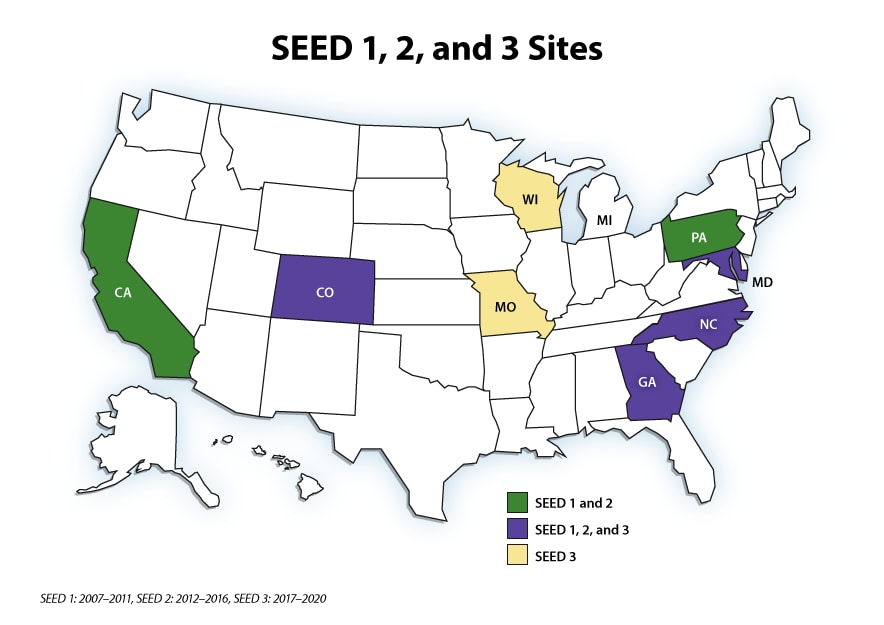SEED 1, 2, and 3
The Study to Explore Early Development (SEED) is a multi-year multi-site study funded by the Centers for Disease Control and Prevention (CDC). It is one of the largest studies in the United States to help us learn more about autism spectrum disorder (ASD) and other developmental disabilities in preschool-aged children. One of the goals of SEED is to identify early behaviors and other factors related to the development of ASD symptoms that impact quality of life. Learning about these factors may shed light on how we can help children with ASD and their families.
Since the launch of SEED in 2007, CDC has conducted three phases of the study, known as SEED 1, 2, and 3. CDC has funded seven sites to conduct SEED. CDC in Atlanta, Georgia serves as the eighth SEED site. Across all study sites, more than 6,500 families participated in SEED 1, SEED 2, or SEED 3, combined. This includes nearly 2,000 families with a child with ASD.
- California SEED: Kaiser Foundation Research Institute and the California Department of Public Health
- Colorado SEED: JFK Partners and University of Colorado School of Medicine, Anschutz Medical Campus
- Georgia SEED: The National Center on Birth Defects and Developmental Disabilities, Centers for Disease Control and Prevention
- Maryland SEED: Johns Hopkins University* and Kennedy Krieger Institute
*Johns Hopkins University also serves as the SEED biorepository center.
- Missouri SEED: Washington University at St. Louis
- North Carolina SEED: University of North Carolina at Chapel Hill
- Pennsylvania SEED: University of Pennsylvania School of Nursing and The Children’s Hospital of Philadelphia
- Wisconsin SEED: The Board of Regents of the University of Wisconsin System
SEED Research Method
SEED 1, 2, and 3 used a case control method. This means that SEED actively looked for children with ASD and compared them to children in two other groups. These groups included children with other developmental delays or disabilities who were receiving education or health services, and children from the general population. All children were between 2–5 years of age when they enrolled in SEED.
The children with other developmental delays or disabilities and those from the general population were compared to children with ASD to see how they differ from one another.
During the study, parents answered questions about their family’s medical history, including the health of mothers before, during, and after pregnancy. They completed questionnaires about their child’s behavior and development. Families were also asked to let SEED summarize information from the mother and child’s medical records, such as past diagnoses and medications prescribed by a doctor. Children had physical and developmental examinations by trained study clinicians. Finally, each parent and child were asked to give a small sample of saliva or blood.
What are we learning from SEED?
As of 2021, there have been more than 65 publications that used SEED data. Some of the main findings from SEED include the following:
- There is not one cause of ASD; instead, the SEED study found several factors that were associated with the development of ASD, including the following:
- Pregnancy factors, such as infection with fever in the second trimester of pregnancy [Read article]
- Mother and child conditions that involve the immune system attacking healthy cells, tissues, and organs (e.g., eczema/psoriasis) [Read article]
- Environmental factors, such as the interaction between air pollution and neighborhoods with high poverty [Read article]
- Children with ASD are more likely than other children to have developmental delays, gastrointestinal problems, and sleep problems, and to engage in wandering and self-harming behaviors.
- Contrary to recommendations, many children with ASD are given psychotropic medication to treat challenging behaviors before they receive behavior therapies. [Read article]
What’s next for SEED?
We will continue to learn more from this important study because analyses of SEED 1, 2, and 3 data are ongoing. We are also analyzing data from SEED Teen, a pilot study that followed children who participated in SEED 1 into adolescence, and SEED COVID-19 Impact Assessment, a survey of families of children who participated in SEED 3 to assess the impact of the COVID-19 pandemic. In 2023, the CDC launched SEED Follow-Up. SEED Follow-Up expands upon SEED Teen to learn more about the services, supports, and needs of children with ASD as they mature, and their families.

